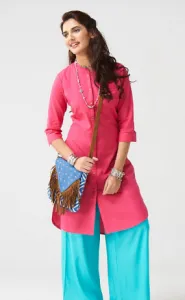Flipkart launches fusion ethnic wear for women in private label

Building on its race to profitability through private label, e-commerce major Flipkart is launching one more category in fashion, its best performing category. Named Anmi, it offers contemporary ethnic wear with ‘stylish yet affordable’ kurtas and kurtis, and will cater to a market that is about 25,000 crores in India.
Flipkart has claimed that it has seen 40% growth in the sale of ethnic wear this year during the festive season. With an increased women shopper base this year, this portfolio is contributing to more than 60% of the overall women’s clothing in this festive shopping period.
Flipkart had launched two fashion private labels launched earlier this year, Divastri (for sarees and dress materials) and Metronaut (for casual men’s wear). The company claims that the two have become top brands on Flipkart in their respective categories within months of launch.
Also read: Can private labels power e-commerce to profitability?
Why this move?
Rishi Vasudev, head of fashion at Flipkart, explains that Flipkart’s private label in women’s fashion is targeted at two different customer segments – one for the small-town shoppers, mostly housewives, is Divastri, and the other for modern, working women, which is Anmi.

For the value customer, kurtas and kurtis still form a bulk of their wardrobe. But there are few brands which cater to them. Unbranded products mostly have poor quality. “We give larger selection and better quality consistently, at a similar price,” says Rishi.
Targeted at 20-25 year old urban women, Anmi is a data-designed brand conceptualised by studying the most desired colours, styles, fits, trims, to even patterns and motifs by understanding what the online shopper is looking for. Anmi’s prices vary from Rs.400 to Rs.700.
Perfect timing
The launch of Anmi has been timed perfectly – right before Diwali which is also the ultimate shopping season. Rishi explains, “This period attracts high intense customers who want to shop more. But we wanted to launch it after getting everything right, for the long term. This is an important part of the business.”

Flipkart claims that all Anmi products have successfully surpassed quality related issues like piling, color bleeding, garment construction, seam slippage etc. Rishi added that NPS (net promoted score) for private label is expected to be 5% better than that of the average brand.
“For now, the product will be sold only by RetailNet, Flipkart’s biggest retailer. It will extend to other sellers in course of time,” he added.
Long term effort
Although there has been no monetary investment, Rishi says, the initiative is the result of a combined effort by the teams for private label, design, and sourcing – the capabilities you need for building fashion. He adds that there are no set targets per se, and the aim was to get product quality, looks, design, etc. right.
“We will do an analysis after two months, and then scale up according to the feedback. Right now, the focus is on getting the model right,” he says. Next in line to be launched in fashion are women’s western wear and kids’ wear.
Hardly ten days ago Flipkart had launched its first in-house large appliances brand, MarQ. The first product to be launched in this category was microwave oven, and is set to be followed by TV, air conditioner, washing machine etc. In July, Flipkart also launched another private brand ‘Billion’.
After focusing on growth for a decade, Flipkart is now endeavouring for profitability under Kalyan Krishnamurthy who took over as CEO earlier this year. Private labels are the only factor that can assure profit for marketplaces, for which sellers’ commissions are much lower than logistics costs.







